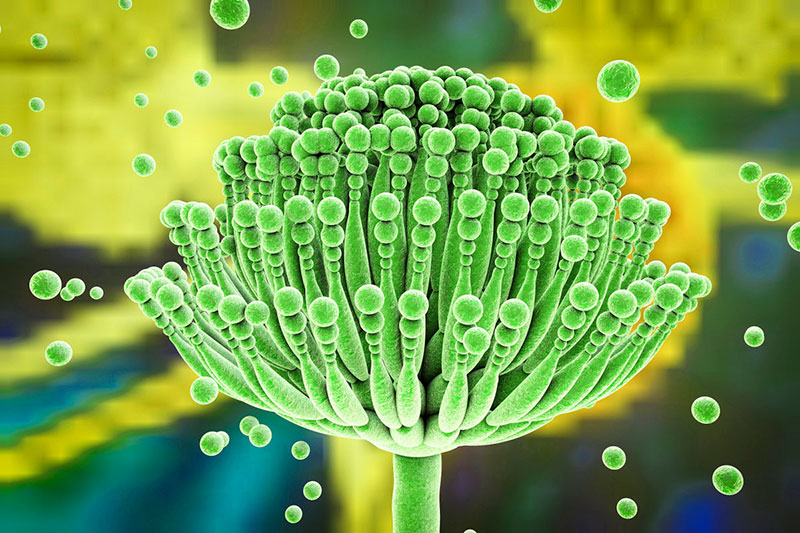Mycotoxins are toxic secondary metabolites produced by fungi or molds in grain in the field or during storage. Mycotoxins may impact grain quality and have carcinogenic effects on animals and humans. Therefore, mycotoxin testing is necessary for food manufacturers to ensure the compliance of their products with strict international regulations, and to protect animal and human health.

With years of experience in food testing, Lifeasible offers analysis for a comprehensive portfolio of mycotoxins, including:
- Aflatoxin: Aflatoxin is a toxic and carcinogenic substance produced by certain strains of fungus: Aspergillus flavus, A. parasiticus, or A. nomius. There are four primary types of aflatoxin in grain and nuts: B1, B2, G1, and G2; and one type of aflatoxin in milk: M1. It has been shown that aflatoxin can cause liver damage, immune system suppression or even cancer. When consumed by livestock, aflatoxin can lead to decreased milk and egg production, which will further interference with reproductive efficiency.
- Ochratoxin: Ochratoxin is formed by fungi species Aspergillus or Penicillium. It is commonly found in barley, wheat, corn, and other commodities. Ochratoxin usually exists in conjunction with aflatoxin and can cause kidney damage.
- Citrinin: Citrinin is produced by fungus species Aspergillus, Monascus, and Penicillium species. It usually occurs in numerous grains such as beans, fruit, olives, herbs, red rice, and spices under poor storage conditions and occurs together with ochratoxin.
- Deoxynivalenol (DON): DON, also known as Vomitoxin, is a tricothecene produced by several species of Fusarium. DON often occurs in many cereal crops such as wheat, corn, barley, oats, and rye. DON is always associated with outbreaks of acute gastrointestinal illness, immuno-suppression, and blood disorders in humans.
- Fumonisin: Fumonisin is a toxin associated with the molds Fusarium moniliforme and F. proliferatum. It is commonly found in corn and corn-based products, as well as in rice. Fumonisin can cause esophageal cancer in humans and pulmonary edema in pigs.
- Patulin: Patulin is mainly found in rotting apples and is produced by fungi species Aspergillus or Penicillium. It has a potential for a mutagenic and/or carcinogenic effect.
- Sterigmatocystin: Sterigmatocystin occurs in the metabolism of fungi as a precursor of aflatoxins and is produced by more than 50 types of fungus, including the Aspergillus fungus species.
- T-2 / HT-2 toxins: The mycotoxin T-2 and its hydrolized form (HT-2) belong to a group of trichothecenes and are formed by fungus species Fusarium. These toxins are frequently found in agricultural products such as oats, maize, barley, and wheat. T-2/HT-2 toxins can severely damage the entire gastro-intestinal tract and cause rapid death due to internal hemorrhage.
- Zearalenone: Zearalenone is formed by fungi of the genus Fusarium. It is typically found in corn and frequently causes estrogenic responses in animals.
As the global leader for mycotoxin analysis, Lifeasible offers a wide range of analytical methods for mycotoxin analysis, as follows:
- Enzyme-Linked Immunosorbent Assay (ELISA). The ELISA technique is based on a coupling reaction between a specific mycotoxin and antibodies specific for those mycotoxins.
- The Lateral Flow Test. For this test, lateral flow strips are used to apply a strip of test medium to a fluid sample, and the presence of harmful mycotoxins can be identified. The lateral flow test enables rapid, on-site identifications of the mycotoxin contamination of commodities. Results can be evaluated visually (semi-quantitative) or quantitatively by means of an LFD reader.
- High Performance Liquid Chromatography Mass Spectrometry (HPLC-MS). HPLC-MS is the most sensitive and selective method. It involves rugged extraction, cleanup by affinity chromatography, and analysis by MS.
- Black Light Detection. Ultraviolet light, also referred to as black light, was commonly used to detect the presence of aflatoxins based on their fluorescence by-products.
With a rich experience in food testing, Lifeasible will provide you with tailored testing methods for your samples. Moreover, using cutting-edge technologies, our services cover a variety of sample matrices, including grains and other raw materials. You will obtain reliable results with high sensitivity. Please contact us for your mycotoxin testing requests.
Our products/services are For Research Use Only. Not For Clinical Use!
